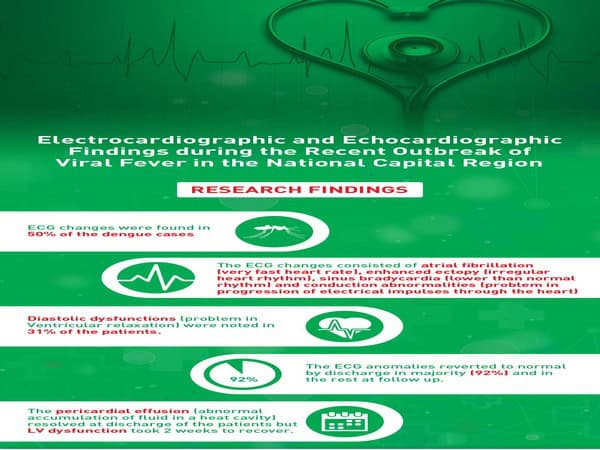New Delhi: Over the period of time, Dengue has become seasonal phenomenon every year. Despite several efforts by government and non-government organizations, dengue is affecting large number of population.
A research conducted by Upendra Kaul, dean and executive director of Clinical Research and Academics, Fortis Healthcare Limited states that dengue can be deadly for those who have heart disease and the study also shows ECG and ECHO changes in patients admitted with dengue fever but with no prior heart ailments.
The research included confirmed serologically dengue cases where a detailed study of electrocardiograph and echocardiograph was conducted.
If someone has dengue fever coupled with chest discomfort, shortness of breath, unnecessary fatigue, treating doctor must get ECG or ECHO done to rule out the possibility of heart involvement. If the changes are detected early, we are able to handle the situation in first interface and can avert heart disease progression.
According to Kaul, “dengue has turned up as a seasonal epidemic in India and we see number of cardiac patients coming with dengue fever. The study that we conducted over a period of time we found that those having heart problem are affected by dengue at large and hence creating a double trouble for us to handle them. Simultaneously, those who had dengue, their ECG & ECHO where showing some temporary malfunction of the heart. However, these were corrected by due course of supportive treatment. But it is very important not to overlook any symptoms on both the cases.”
If someone already has a heart disease, the patient often is on aspirin. In case of dengue mosquito bites the heart patient there is often platelet deficiencies in the patients resulting in a critical situation. Continuing aspirin in these patients can be dangerous situation. Dengue shows its symptoms after 3-14 days of mosquito bite hence it is advised to heart patients that they should keep the environment clean and avoid any mosquito bites. In case of fever they should see a doctor and get appropriate tests done.
Here are the findings of the research:
First, ECG changes were in 50 percent of the dengue cases.
Second, the ECG changes consisted of atrial fibrillation, enhanced ectopy, sinus bradycardia and conduction abnormalities.
Third, diastolic dysfunctions were noted in 31 percent of the patients.
Fourth, the ECG anomalies reverted to normal by discharge in majority and in the rest at follow up.
Fifth, the pericardial effusion resolved at discharge of the patients but LV dysfunction took two weeks to recover. (ANI)

